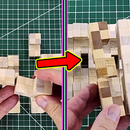Introduction: Recommended Supplies for Basic Soldering
In this Instructable I'll be going over some of the basic supplies that I would recommend having if you're going to be doing much soldering. These are supplies that you can solder without, but they will be helpful to have. If you haven't seen the other 2 Instructables in my Tools and Supplies for Basic Soldering sub-series, I would recommend checking those out.
If you would like to watch a video of this, you can check that out here: https://youtu.be/2DpVQL480EY
Step 1: Desoldering Wick
Similar to a desoldering pump, desoldering wick is used to remove solder. But where a desoldering pump will suck up the melted solder, desoldering wick will soak up the melted solder. Sometimes it's also called solder wick, solder braid, or desoldering braid. It's basically just a braid of thin copper wires with a light coating of flux. You can check out my Desoldering Instructable where I go into detail on how to use this.
Here are links for some options:
Step 2: Soldering Iron Tip Cleaners
You will need to clean the tip of your soldering iron every now and then, and at least whenever you finish using it. If it gets too dirty or gets too much build up on it, then it won't work as well as it should. 2 ways to clean them are to wipe the tip onto a regular damp sponge, or to use a brass wire sponge. I personally prefer using the brass wire sponge because you don't need water, which means that the iron tip doesn't cool down when you clean it. But a big warning about cleaning your soldering iron tip: Do Not Sand Or File The Tip. It has a special coating on it that helps it work properly. If you sand or file that coating off, the tip will be ruined. The brass wire sponge I mentioned here is designed to be safe for the tip.
Here are links for some options:
Step 3: Spare Wire
Sometimes when you're soldering you'll need a bit of extra wire, so it can be handy to keep some on hand. Wires come in different thicknesses, or gauges, and also different insulation types, like plastic, silicone, or enamel. There is also solid wire and stranded wire. Solid wires are more rigid, and stranded wires are more flexible. The type of wire you will need depends on the project you're working on. If you find that you need the same type and size consistently, it's a good idea to keep some extra of that type on hand.
Here are links for some options:
Step 4: Heat Shrink
A lot of the time when you are soldering wires, you'll be left with some exposed wires. You'll usually want to protect the wires from shorting out, and this is where heat shrink is needed. It's very easy to use. Just slide it over the exposed wires then heat it up so that it shrinks onto the wires. Just remember, sometimes you'll need to slide it onto the wire before you solder it. And if you have a Helping Hands with sharp teeth, you can put some heat shrink on it to help protect your wires.
Here is a link for a Heat Shrink Kit:
Step 5: Flux
Flux can be found in different forms. It can be a liquid, or a paste. It can be a cream, or a tacky gel. It might come in a tub, or a tube, or even a pen shaped container. Most types of flux, when used, should be cleaned off of the parts after you're done soldering, but there are some that are considered as a "No-Clean" type of flux. And it's important to remember that, just like solder, flux can be found as a plumbing type or an electronics type. While plumbing flux is perfect to use on plumbing, it should NOT be used for soldering electronics. I highly recommend checking out my Instructable about Using Flux, where I explain and demonstrate how it works.
Here are links for some options:
Step 6: That's It!
These are some of the main supplies that I recommend for basic soldering, but if I missed any that you would also recommend, please leave a comment and let us know what it is. Also let me know if you would like me to make individual Instructable about each of these items where I go into more detail. Thank you for checking out this Instructable!

Participated in the
Anything Goes Contest













